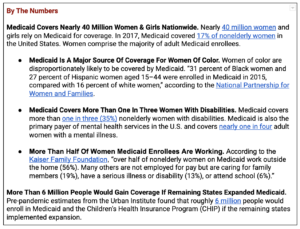
April is Medicaid Awareness Month. For decades, Medicaid has been a major source of coverage for women and, now, it is serving as a critical safety net as millions of women have lost their jobs or left the workforce during the COVID-19 pandemic. Women make up the majority of adult Medicaid enrollees, as they are more likely to have low-incomes or qualify based on their parenting status. Women — and especially women of color — have been disproportionately impacted by pandemic-related job losses, suggesting they have lost employer-sponsored health coverage at higher rates. But experts say an overwhelming majority of people who have lost coverage have been able to get covered under Medicaid or the Affordable Care Act (ACA).
Despite former President Donald Trump’s years-long war on Medicaid, the program is now stronger than ever. President Biden has already started to reverse many of Trump’s harmful Medicaid policies, and he is working to strengthen the program through the American Rescue Plan, the most significant health care expansion in a decade. In addition to providing affordable coverage options for millions of uninsured Americans through the ACA, the American Rescue Plan provides robust financial incentives for the 14 states that have not yet implemented Medicaid expansion. The law also extends Medicaid coverage to new mothers one year postpartum. Protect Our Care recently released a report detailing the impact of the American Rescue Plan on women’s lives.
Republican Efforts To Block Medicaid Expansion Hurt Women
The ACA and its expansion of Medicaid helped millions of women gain coverage and access to health care. Research confirms that Medicaid expansion increases access to care, improves financial security, and leads to better health outcomes. A growing body of evidence shows that the expansion of Medicaid has saved lives. Despite the overwhelming benefits of Medicaid expansion, Republicans have spent years undermining the ACA and its expansion of Medicaid at every turn, blocking millions from coverage.
In 2019, 11 of the 19 states with women’s uninsured rates above the national average had not adopted Medicaid expansion. By rejecting expansion, these states are worsening the maternal health crisis and limiting health care access for the women who need it most. According to the Kaiser Family Foundation: “Uninsured women often have inadequate access to care, get a lower standard of care when they are in the health system, and have poorer health outcomes. Compared to women with insurance, uninsured women have lower use of important preventive services such as mammograms, Pap tests, and timely blood pressure checks.”

Medicaid Is The Largest Payer Of Reproductive Health Care Coverage. Medicaid covers about one in five women of reproductive age, giving them access to reproductive health care services such as birth control, cancer screenings, and maternity care without cost-sharing. Medicaid accounts for 75 percent of all public expenditures on family planning services.
- Medicaid Is The Largest Single Payer Of Pregnancy-Related Services. Federal law requires that Medicaid cover pregnancy-related services and postpartum care to women with incomes up to 133% of the federal poverty level. Many states have expanded these guidelines.
- Medicaid Covers Almost Half Of All Births In The United States. Medicaid is a vital source of coverage for new mothers; it covered 43% of all births in the United States in 2016, and it helps nearly half of all pregnant women access prenatal care and child delivery services.
- Medicaid Expansion Improved Access To Primary Care & Family Planning. Two studies from Michigan showed that Medicaid expansion doubled low-income patients’ access to primary care, and that enrollees experienced improved access to birth control and family planning.
Medicaid Improves Access To Care For Women. Women with Medicaid are far more likely to receive care than uninsured women. According to the Kaiser Family Foundation, women with Medicaid coverage are less likely than women with private insurance to report delaying forgoing care due to cost. Women with Medicaid coverage receive preventive care at roughly the same rates as women with private coverage.
Medicaid Helps Pay For Long-Term Care, Mostly For Elderly Women. Medicaid pays for roughly half of the nation’s long-term services and supports. Women account for 60 percent of the 11.7 million dual-eligibles, or people who rely on both Medicare and Medicaid for coverage. Most dual-eligibles are elderly, and many need Medicaid coverage for their long-term care needs. Medicaid nearly 40 percent of Latina and African American women over 65 who are also covered by Medicare.
Medicaid Creates Jobs In The Health Industry, Which Employs Nearly 23% Of All Women In The American Workforce. According to the National Women’s Law Center, “Women’s high participation in the health care industry, which employs more than 22.8% of all women in the workforce, means that Medicaid disproportionately creates jobs for women. This is especially true because Medicaid covers services that other payors typically do not cover and are more likely to be delivered by women, like long-term services and supports.”
The ACA’s Medicaid Expansion Improves Maternal Health. Research from the Georgetown Center for Children and Families found that Medicaid expansion has helped fill gaps in maternal health coverage, leading to healthier mothers and babies. It also helps new mothers maintain access to coverage and important postpartum care after giving birth. Multiple studies draw the connection between Medicaid expansion and reduced infant and maternal mortality rates. One study found that reductions in maternal mortality in expansion states were concentrated among Black mothers, “suggesting that expansion could be contributing to decreasing racial disparities in maternal mortality.”

